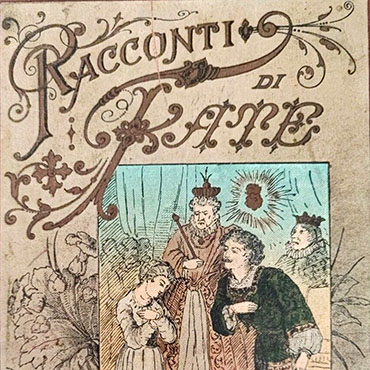A native of Lugo di Romagna, where he was born in 1826, Donati was unable to study for family reasons, but as a young man he was, nevertheless, well read. After the First War of Independence he followed his family to Tuscany and thanks to the help of some friends he was able to attend the University of Pisa. Alongside his job as a private tutor he became a freelance journalist in Florence, working with many dailies and also for the “Nuova antologia”. After a number of months employed in the management of the galleries and museums of Florence, from the period of the provisional government of Tuscany and later with the new Italian State, he held many posts, some of them important, within the Ministry of Education, where he was held in high esteem by the series of ministers in charge of the Department, and especially by Michele Coppino.
Favaro commemorated him at the Istituto veneto, of which Donati had been a corresponding member. In general Favaro judged the talk a “worthy tribute” to Donati’s literary merits, as a writer of fiction and of books for schools containing “strange histories, fantasies, sketches, stories, and novels”. But as far as he himself was concerned, recognition was “very fitting”, because he felt he owed him “very much” for the happy outcome of the Galileo publishing enterprise. Donati had made the cause of the national edition his own and he had been the one to edit the text of the royal decree that on 20 February 1887 had authorised the start of the work at the State’s expense, defining Favaro’s contribution a “very noble design for the benefit of studies and to the honour of Italy”. He had fought, albeit without success, for getting a longer print-run of the volumes, with the possibility of putting them on sale, and he had devised the solution of a cheap edition, which “unfortunately did not go beyond the first volume, and had to be thrown into the sea during a storm”, which, without Donati’s “brave intervention, would have engulfed the main edition as well”. It was again thanks to his prestige that every library and every scientific institution in Italy and abroad had received a complimentary copy of the Opere di Galileo Galilei, so that they could be consulted by the largest possible number of scholars. After he left the Ministry for bureaucratic reasons of staff rotation, Donati dedicated himself for years to the project for a dictionary of new words coined because of actual needs for the modernisation of the language or even because of the ignorance of writers. Favaro saw in his prose “elegance of style, purity of language, moderation of thought and expression, not, however, without a certain sparkle or some examples of good-natured irony”. Cesare Donati died in Rome in 1913.


